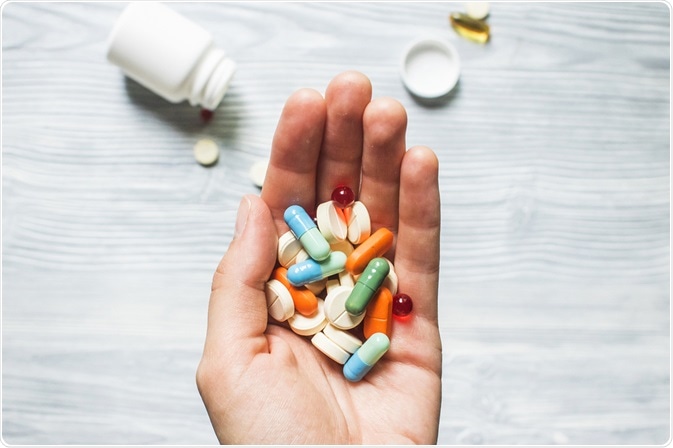Antidepressants are a type of psychiatric medication used to treat depression, anxiety, obsessive-compulsive disorder (OCD), and post-traumatic stress disorder (PTSD) among other mental health conditions.
 Image Credit: Lunatta / Shutterstock.com
Image Credit: Lunatta / Shutterstock.com
Although their exact mechanisms are not fully understood, many of them target certain neurotransmitters in the brain and increase their levels in the brain to help improve mood and reduce feelings of anxiety or stress.
Neurotransmitters are chemical messengers that send signals across neuronal synapses (a part of the central nervous system that allows neurons to pass electrical and chemical signals to other neurons) and antidepressants often target serotonin and noradrenaline, which is also called norepinephrine.
Some antidepressants also work by increasing the amount of dopamine in the brain, a neurotransmitter that is well known for lifting low moods.
While there are many factors to consider when beginning antidepressant treatment, many people do not know about the withdrawal symptoms that may arise from their chosen medication when they decide to stop using it or if they reduce the dose.
As a result, it is important to thoroughly discuss which antidepressants are best for you and compare the reported side effects and withdrawal symptoms for each one.
It is important to note that stopping antidepressant medication suddenly and without consulting a medical professional is not recommended.
What are withdrawal symptoms?
Withdrawal symptoms (also called antidepressant or SRI discontinuation syndrome) are unpleasant physical and mental effects from reducing the dose of or stopping an antidepressant. Withdrawal symptoms can be experienced with many medications and drugs, including alcohol.
Withdrawal symptoms can make it hard to come off certain antidepressant medications that are known for inducing severe withdrawal symptoms, but it does not mean a person is addicted to an antidepressant if they experience withdrawal symptoms. Withdrawal symptoms are more severe if an antidepressant has a short half-life.
What does half-life mean?
A half-life is the time it takes for the amount of a drug in your body to reduce by half. A half-life does not change depending on the dosage a person is taking or the amount of time they have been on medication. Additionally, the half-life of a medication can vary from person to person.
Half-life and selective serotonin reuptake inhibitors (SSRIs)
SSRIs are a family of antidepressants that improve mood by increasing serotonin levels in the brain. The approximate half-life of a range of common SSRI medications are:
- Fluvoxamine – 17 to 22 hours
- Paroxetine – 24 hours
- Sertraline – 22 to 36 hours
- Escitalopram – 30 hours
- Citalopram – 36 hours
- Fluoxetine – 96 to 144 hours (4 to 6 days).
Half-life and serotonin-noradrenaline reuptake inhibitors (SNRIs)
SNRIs are similar to SSRIs in that they reduce the reuptake of serotonin and noradrenaline (or norepinephrine) and thereby increase their levels in the brain.
The approximate half-life of common SNRI medications are:
- Duloxetine – 8 to 17 hours
- Venlafaxine – 4 to 7 hours.
Prolonged-release versions of venlafaxine have an absorption half-life of 7.5 to 13.9 hours, meaning half of the medication will have been absorbed by the body in that time, and an elimination half-life of 4 to 7 hours as immediate-release venlafaxine does.
Half-life of tricyclic antidepressants
Tricyclic antidepressants are an older type of antidepressant that are not usually the first choice of antidepressant as the effects of overdoses can be very dangerous, and they are more likely to cause side effects than SSRIs and SNRIs.
Common tricyclic medications and their approximate half-life are listed below.
- Amitriptyline – 9 to 25 hours
- Lofepramine – 12 to 24 hours
- Clomipramine – 12 to 36 hours
- Imipramine – 19 hours
- Trimipramine – 23 hours
- Doxepin – 33 to 80 hours (1.5 to 3.3 days)
- Nortriptyline – 36 hours
- Dosulepin - 50 hours (just over 2 days).
Trazodone, a serotonin antagonist and reuptake inhibitor, has a half-life of 5 to 13 hours. Mianserin, a tetracyclic antidepressant, has a half-life of 6 to 39 hours.
Half-life and monoamine oxidase inhibitors (MAOIs)
MAOIs are an old type of antidepressant that are not widely used as they cause potentially serious side effects. The approximate half-life of MAOI medications should they be prescribed are:
- Tranylcypromine – 2 hours
- Phenelzine – 11 to 12 hours
- Isocarboxazid – 36 hours
A reversible MAOI called moclobemide has an approximate half-life of 2 to 4 hours.
 Image Credit: ldutko / Shutterstock.com
Image Credit: ldutko / Shutterstock.com
What type of withdrawal symptoms can be experienced?
As neurotransmitters are not only active in the brain but the entire body, the absence of antidepressant medication can cause changes to neurotransmitter levels that can be felt body-wide. There are a wide range of mental and physical symptoms when coming off antidepressants, with common complaints including:
- Digestive symptoms: nausea, vomiting, cramps, loss of appetite
- Sleep changes: difficulty falling or staying asleep, vivid dreams or nightmares
- Balance: dizziness, light-headedness, vertigo
- Movement changes: tremors, restless legs, uneven gait, difficulty coordinating speech
- Emotional symptoms: mood swings, agitation, anxiety, manic feelings, depression, irritability, confusion, paranoid, suicidal
- Unusual sensations: pain, numbness, hypersensitivity to sound, “brain-zap”, which is a feeling of an electric shock to the head,
- Other symptoms: sweating, flushing excessively, extreme reactions to hot weather.
Venlafaxine, sertraline, paroxetine, and citalopram are known for causing more unpleasant withdrawal symptoms than other types of antidepressants. Extended-release versions of these medications take longer to absorb in the body, but are broken down and diluted at the same rate and as such are still as likely to cause withdrawal symptoms as immediate-release versions of these drugs.
How to improve withdrawal symptoms
Although withdrawal symptoms cannot always be avoided, they can be improved while patients come off or reduce the dose of their antidepressant. Reducing the dosage very gradually will incur less severe withdrawal symptoms than stopping suddenly, which is not recommended with any type of antidepressant.
Planning when to come off antidepressants can help you to manage any withdrawal symptoms can minimize their effects on your day to day life. It is important to make sure you are feeling secure in your mental health when choosing to come off antidepressants to avoid relapses of your condition.
Overall, it is important to stay in regular contact with a healthcare provider so they can offer advice and monitor any symptoms being experienced.
References
Further Reading
Last Updated: Jan 11, 2021